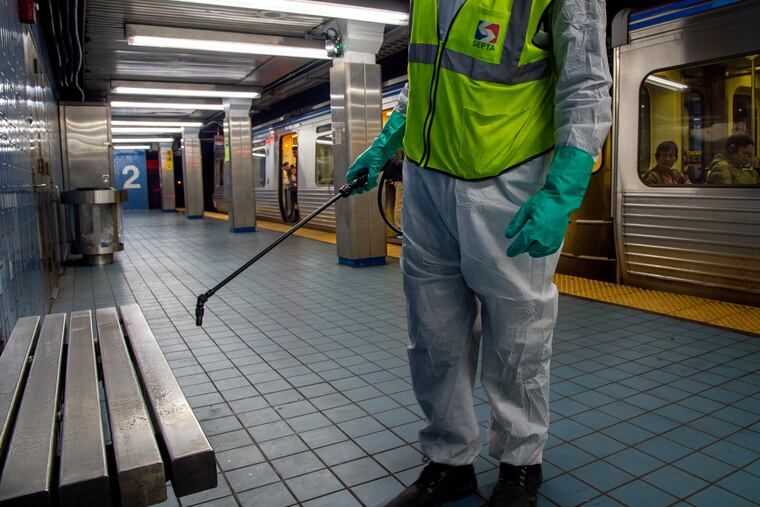SEPTA, PATCO see slight drop in ridership amid the coronavirus
Transit agencies may eventually consider cutbacks, but "if people need us, we’re going to be here to serve them,” said John Hanson, CEO of Delaware River Port Authority, which operates the PATCO line.

SEPTA and PATCO ridership has taken a dip as the region responds to the coronavirus.
From Monday through Wednesday, SEPTA ridership was down about 3% on buses, subways, and trolleys from its average year-to-date figures, while PATCO saw about a 6% reduction during the same period. Both have promoted their cleaning efforts and are prepared to reevaluate service should ridership continue to fall.
“If things continue to increase in the severity, we will likely scale back the number of employees that we have here, and we’ll likely reduce the number of trains," said John Hanson, CEO of the Delaware River Port Authority, which runs PATCO, "but if people need us, we’re going to be here to serve them.”
It’s not clear whether commuters are avoiding public transportation as a precautionary measure against the coronavirus, or if a growing number of event cancellations plus workplaces encouraging employees to telecommute are contributing to a decrease. No call to avoid public transportation has come from Philadelphia officials.
“We’re also not recommending closing transit services or transportation services, such as the airport," Philadelphia Health Commissioner Thomas Farley said during a news conference Thursday. "In those situations, there is less close direct contact, and those are also crucial to the functioning of the city.”
I noticed after work yesterday but this morning was just stark. I was able to sit on Septa. The Schuylkill was empty. All of my normal inconveniences were not inconvenient and I'm irked by it. I will never know peace
— Chris Olley (@chrisoIIey) March 12, 2020
On Thursday, Philadelphia announced it would ban public gatherings of more than 1,000 people for 30 days. Gov. Tom Wolf’s administration announced sweeping “social distancing” measures in Montgomery County and encouraged that gatherings of more than 250 individuals be canceled statewide.
Dozens of presumed positive cases of the virus have been reported in Pennsylvania and New Jersey, while President Donald Trump’s travel ban from Europe and the suspension of professional sports sent shock waves late Wednesday.
“I think all of that probably will cause people to rethink many of their habits, including the use of public transit," Hanson said.
PATCO is “gearing up” to institute a twice-daily cleaning of the inside of its trains, in addition to procedures it detailed last week that include daily cleaning and sanitation of often-touched surfaces.
SEPTA is maintaining its normal cleaning efforts, but crews are sanitizing highly touched areas such as turnstiles and kiosks at least three times a day. The cleaning is happening systemwide, but attention has been turned to high-traffic areas such as the City Hall and 69th Street stations.
“This week seems to be when things kind of started moving,” SEPTA spokesperson Andrew Busch said.
SEPTA is preparing for scenarios that could arise from a larger dip in ridership or uptick in employee absenteeism, Scott Sauer, assistant general manager of operations, said Wednesday.
“Nothing is off the table at this point," Sauer said. "We’re taking it as it goes; it’s ever-changing, minute by minute, so we’re watching, but we’ll have plans if we had to reduce service. If we had to scale back, if we have employees that suddenly take ill, then we’ll have plans for that as well.”
SEPTA could not provide figures on Regional Rail ridership.
Dena Driscoll, chair of the urbanist group 5th Square, has been thinking about social distancing and measures other cities are taking to prevent COVID-19’s spread. New York Mayor Bill de Blasio heeded a call to avoid crowded trains, prompting a petition for “emergency bicycling infrastructure,” for example.
For those able, Driscoll said, now might be the time to consider alternative forms of transportation, such as walking and biking, to prevent overcrowding on public transportation.
She offered suggestions to help systems run efficiently, such as closing certain streets for bikes or buses that could see supplemental service. The method could almost work like a snow emergency route, she said.
“We could leave the space for people who really need it,” she said.